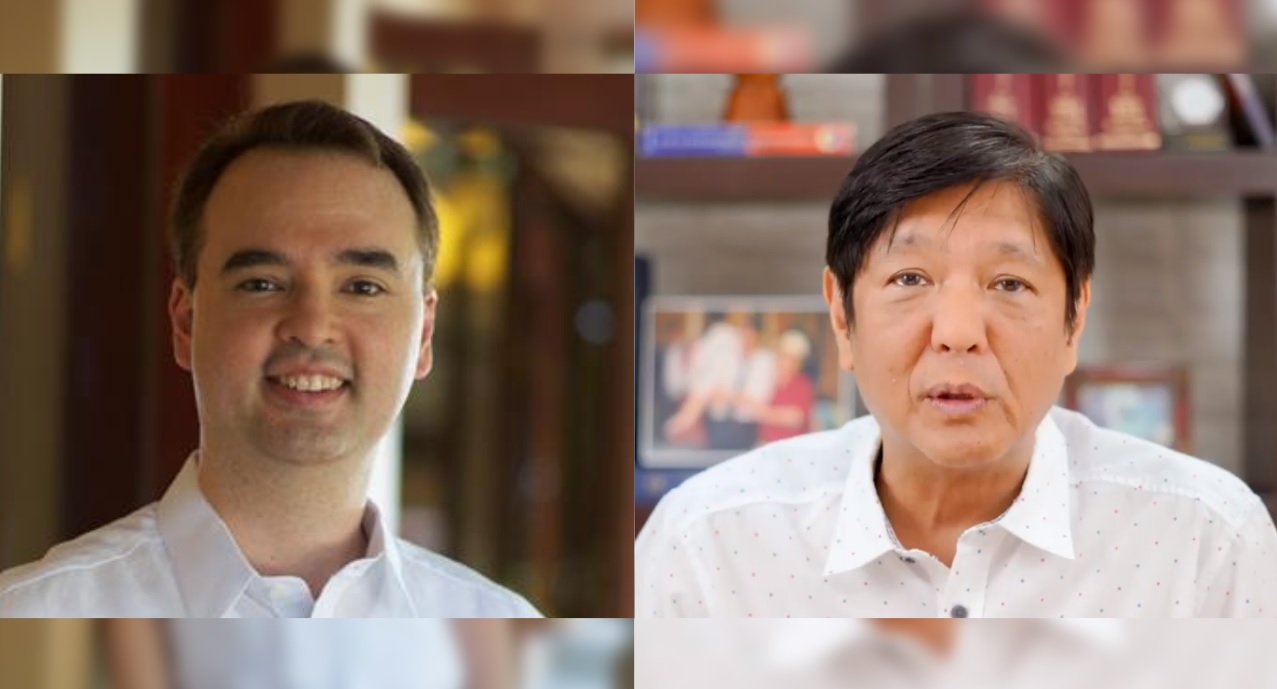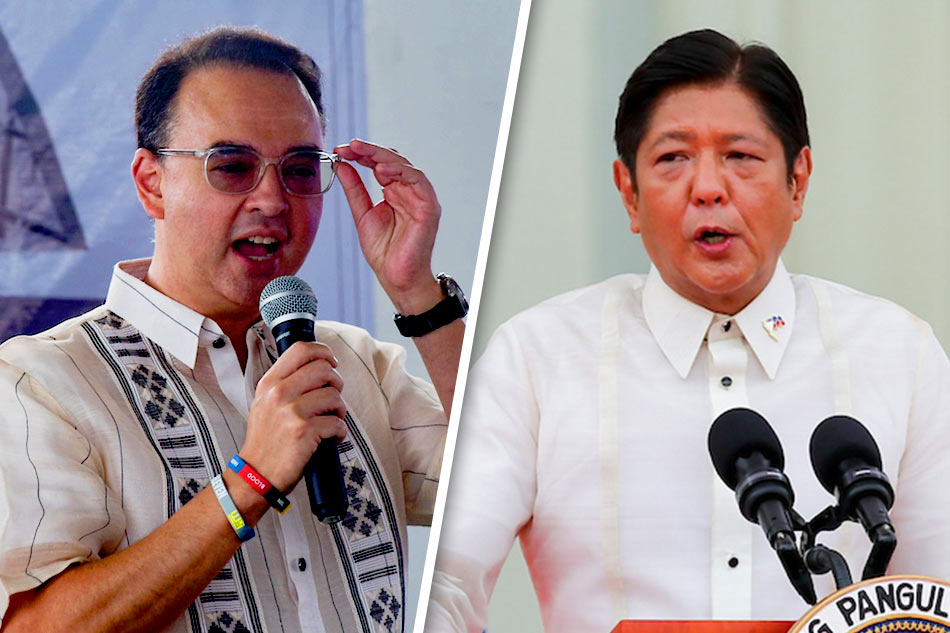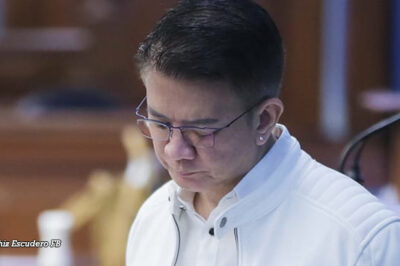
In a development that has sent shockwaves through the Philippine political establishment, an unprecedented proposal has been put forth, calling for the entire government apparatus, including the President, to resign. This audacious move, initiated by Senator Alan Peter Cayetano, has ignited a fierce political firestorm, sparking a heated debate about national stability, corruption, and public trust.
At the center of the controversy is Senator Cayetano’s call for a “snap election,” a concept typically reserved for moments of deep national crisis. However, Cayetano’s proposal is not limited to a few positions but advocates for a complete overhaul, demanding that every elected official—from the President, Vice President, Senators, and members of Congress—voluntarily step down to pave the way for a new election. The official reason behind this extreme measure, according to Cayetano, is to “restore public trust in government institutions” and establish a “clean slate” for the Filipino people.
This proposal comes amidst tense corruption investigations, particularly those led by the Senate’s Blue Ribbon Committee, focusing on “anomalous flood control projects.” These probes have created deep fissures within the Senate, even leading to Senator Panfilo “Ping” Lacson’s resignation from his post as Chairman of the Blue Ribbon Committee due to “doubts” from his own colleagues. Lacson’s departure highlighted the severity and sensitivity of the issues at hand, signaling that the fight against corruption was being waged at the highest levels.

However, Cayetano’s call for a snap election has been met with fierce resistance, especially from supporters of President Ferdinand “Bongbong” Marcos Jr. (BBM). Critics have dismissed Cayetano’s proposal as “insane” and “ill-conceived,” arguing that it would trigger catastrophic political and economic chaos. One commentator highlighted the immense financial burden of a nationwide snap election, citing COMELEC estimates that even a smaller regional election would cost billions of pesos. The cost of a national snap election could be astronomical, compounding the financial losses the country has already suffered due to corrupt practices.
The crux of the debate is the inclusion of President Marcos Jr. Supporters of BBM vehemently oppose including him in the resignation proposal, hailing him as the only president with the “courage to expose corruption.” They argue that unlike predecessors who allegedly covered up corruption scandals, BBM has actively and bravely confronted the “syndicate system” eroding the government. For his supporters, forcing BBM to resign at this critical juncture would be a severe blow to the anti-corruption fight and could potentially return the country to an era of “business as usual.” Some have even gone so far as to suggest that BBM’s term should be extended by six years to allow him to complete his mission of reforming a “broken” system.
The criticism of Cayetano does not stop there. Some speculate that the true motive behind his proposal is a blatant attempt to derail or halt the ongoing corruption investigations, especially those that could implicate his political allies. The commentator challenged him to address issues like the unfulfilled promise of a “10k” (10,000 peso) subsidy he had previously made. Cayetano’s call for voluntary resignation has also been branded as hypocritical, with direct challenges being issued for him to show his sincerity by being the first to step down.

Another controversial aspect of Cayetano’s proposal is the provision that would prohibit all incumbent officials from running in the next election cycle. This, critics argue, would require significant amendments to the current constitution, a complex and challenging process that has seen even minor constitutional reform efforts, such as economic provisions, face substantial opposition in the past. The fact that Cayetano is proposing such a sweeping change when he and his allies have resisted less controversial constitutional amendments in the past has raised questions about his consistency.
Amid the escalating political tensions, Senator Cayetano’s proposal has laid bare the deep fractures within the government and public opinion. It reflects a larger struggle between those seeking to cleanse a system plagued by corruption and those accused of trying to protect established interests. With President Marcos Jr.’s term having two years remaining, the debate over a snap election and his resignation has become a political flashpoint, testing the strength of democratic institutions and the resolve of those seeking to shape the nation’s future.
What happens next will test the limits of Philippine politics. Will the call for a snap election gain traction and lead to a significant shift, or will it be dismissed as an ill-timed and destructive political maneuver? The answer will depend not only on the political machinations but also on the will of the Filipino people and their leaders’ commitment to the principles of good governance.
News
Ang Lihim sa Likod ng Belo
Ang buhay ko ay parang isang modernong fairytale. Ako si Clara, isang simpleng dalaga na pinalad na umibig at ibigin…
SINO SIYA?! Ang Nakakapanindig-Balahibong Misteryo sa Likod ng Bagong Kapamilya A-Lister Aktres: Ganda, Talento, Karisma, at Isang Malaking Proyekto – Handa na Ba ang ABS-CBN sa Kanyang Pagdating na Yayanig sa Showbiz?
Sa dynamic na mundo ng Philippine entertainment, kung saan ang mga bituin ay sumisikat at lumulubog nang may bilis, mayroong…
ISANG REYNA NG SHOWBIZ, MAGBABALIK NA SA KAPUSO NETWORK? ANG MGA LIHIM NA CLUE AT NAKAKAGULAT NA PAHAYAG NA NAGPAPAHIWATIG SA PINAKAHIHINTAY NA COMEBACK NG ISANG ALAMAT SA TELEBISYON!
Sa dynamic na mundo ng Philippine entertainment, kung saan ang mga bituin ay sumisikat at lumulubog nang may bilis,…
NAKABABALIW NA PAGLALAKBAY SA PUSO NI GERALD ANDERSON: Kilalanin ang 11 Babaeng Nagbigay Kulay, Kilig, at Kontrobersya sa Kanyang Buhay—Mula sa Mga Unang Pag-ibig Hanggang sa mga Huling Hiwalayan na Yumayanig sa Showbiz!
Sa mabilis at punong-punong-intriga na mundo ng Philippine showbiz, kakaunti ang nakakakuha ng parehong antas ng atensyon at diskusyon tulad…
Naku Po! Ang Nakakapanindig-Balahibong P30 Milyong Donasyon na Yumayanig kay Senador Chiz Escudero: Ang Pag-Amin, ang Nawawalang Pondo, at ang Nakakagulat na Paglobo ng Bilyon-Bilyong Kontrata – Ito Ba ang Magpapahaba sa Kanyang Panunungkulan sa Senado o Magiging Dahilan ng Kanyang Pagbagsak?
Sa labis na pinagdedebatehang tanawin ng pulitika sa Pilipinas, kung saan ang mga pangalan ay mabilis na umaangat at…
NAKAKAGULAT NA TSISMIS, YUMANIG SA BUONG BANSA! TVJ, SENTRO NG MGA TEORYA MATAPOS KUMALAT ANG LARAWAN NI VIC SOTTO SA ISANG LAMAY! ANG KATOTOHANAN SA LIKOD NG PAGPANAW NI JOEY DE LEON, INILABAS NA!
Sa loob ng halos limang dekada, ang pangalan ng TVJ—Tito Sotto, Vic Sotto, at Joey de Leon—ay naging kasingkahulugan na…
End of content
No more pages to load









